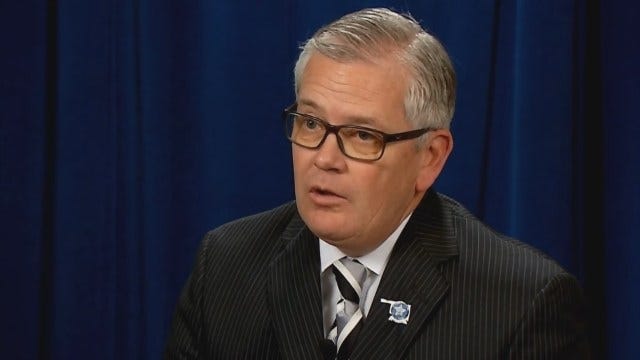9 Investigates: Mental Health Care In Oklahoma
<p>It's estimated 22 percent of Oklahomans suffer with some form of mental illness. </p>Wednesday, March 30th 2016, 11:04 pm
It's estimated 22 percent of Oklahomans suffer with some form of mental illness. Barely a third them get any sort of treatment for their illness, and that includes people with health insurance.
Under federal and state parity laws, mental health care should be covered by insurance, but 9 Investigates has learned that is still far from being the reality. The result is that families across the state remain unduly burdened by the challenges of caring for loved ones with mental illness.
"He just kept falling back into the same patterns, depression," said a metro mother, who asked to be referred to as "Tara."
Tara wants to conceal her identity, but not the fact, she says, that she can't get adequate treatment for her mentally ill 20-year-old son.
"It's a fight," said Tara, in a recent interview.
Her insurance, Tara says, has limited her options, even when her son recently threatened to kill himself.
"I would think they would maybe say, 'Okay, let's go to an inpatient [center] to figure out--to really help you'," Tara commented, "but it was-- five days and then, you can go home."
Mental health advocates say that's just ridiculous.
"It's a no-brainer that five days in an in-patient facility for wanting to kill yourself, or attempting to kill yourself, or being homicidal with someone else, is not going to solve your problem," said Traci Cook, Executive Director of the National Alliance of Mental Illness's Oklahoma chapter.
Cook says, sadly, Tara's story is not unique, and the numbers back it up.
It's estimated there are as many as 950,000 Oklahomans struggling with mental illness or addiction. Last year, officials say, only 200,000 were able to access treatment services.
A big reason for that, Cook believes, is that society still views mental illness differently than it does diseases like cancer or diabetes, where there is an expectation that insurance will cover a full range of treatment.
"The same should be true for mental health," Cook stated, "but it's not."
Parity laws were intended to change that.
There is both a federal parity law and, in Oklahoma, a state parity law. Essentially, they say that health insurance must provide coverage for mental health care that is equal to, or better than, coverage for physical health care.
Experts say the laws, which have been in effect for a decade and longer, have helped, but contain numerous exceptions.
"For example," said Terri White, Commissioner of the Oklahoma Department of Mental Health and Substance Abuse Services, "the law on Oklahoma's books only applies to certain mental illnesses."
Commissioner White also says the federal parity law excludes small businesses and self-insurers. Still, she says insurance companies should see that treatment benefits everyone in the long-term and need to step up their game.
According to SAMHSA, the federal mental health agency, studies show 70 percent of Oklahoma youth who have experienced a major depressive episode got no treatment at all.
Certainly, not all of that can be blamed on lack of coverage by insurers. But, studies show, even among children who have private insurance, almost 20 percent report their insurance won't cover mental illness.
"And we know that when someone has a disease or is ill," said Commissioner White, "if we don't get the right health care, we don't recover as quickly or potentially not at all."
No one understands that better than Cathy Costello.
Costello's husband, late labor commissioner Mark Costello, was stabbed to death in August 2015 by their son Christian, whose battle with mental illness has been undermined, she says, by limits on the treatment insurance allows.
"He needed something longer than a one-day stay, a three-day stay, a one-week stay," Costello lamented.
Now she is determined to do something about it. Costello has agreed to be the face of a new Oklahoma Insurance Department campaign encouraging Oklahomans to be better informed about the mental health care that their particular policies cover.
11/3/15 Related Story: Labor Commissioner’s Widow Speaks Out for Change In Mental Health System
"Policies are beginning to provide some coverage," explains Costello, in a new PSA produced by the Insurance Department.
Insurance Commissioner John Doak, who says he was close with Mark Costello, feels the campaign is an appropriate way to honor his late friend, while also helping families, like the Costellos, make sure they're being treated fairly by their insurance providers,
"And if they do not feel that they are," Doak stated, "then helping them on an appeal process."
Parity was a foreign concept to Tara, as surveys show it is still to the vast majority of Americans.
"I just thought you're supposed to fight with insurance," Tara said, "this is what happens."
Now that she's been enlightened, though, Tara says the insurance commissioner will be hearing from her.
Mental health advocates say that's the key: "The people have got to be the ones to tell their stories, just like Tara did," said Traci Cook, "and to stand up and do something about it."
Until that happens, Cook says, nothing will change.
More Like This
March 30th, 2016
January 2nd, 2025
September 29th, 2024
September 17th, 2024
Top Headlines
March 17th, 2025
March 17th, 2025










